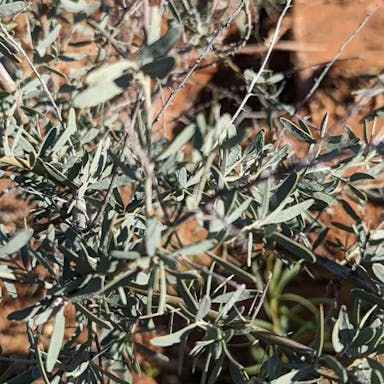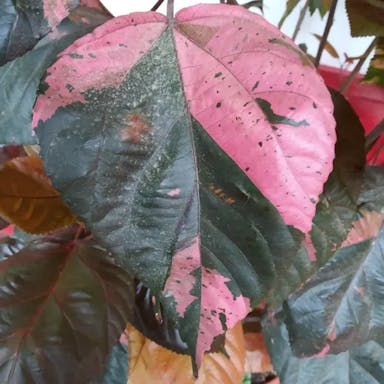Dalby myall, also known as Acacia stenophylla, is a plant native to Australia, specifically found in Queensland and New South Wales. The name
Dalby myall
- Scientific name
- Acacia stenophylla
Basic Information
- Fabaceae Family Acacia Genus Dalby myall Species
- Fabaceae > Acacia > Acacia stenophylla
- 83%
- The Completeness of This Encyclopedia
Please help us complete the encyclopedia, Terrarium is a encyclopedia service to be completed with everyone in the world. Currently, this page is 83% complete. For more information on how to contribute, please click here.
- Shrub
- Tree
- Height
- 500cm ~ 1000cm
- Flower Color
- Leaf Color
- Anthesis
- spring
- Sunlight Exposure
Full Sun Long hours of sunlight from morning to afternoon Partial Shade A location in the shade of a tree or where either the morning or afternoon is shaded Full Shade A place where there is no direct sunlight
- Full Sun
- Hardiness Zones
This is an indicator to know to which zone each plant can winter. Knowing the zone of each plant gives you an idea of the cold temperature resistance when grown in the ground without a roof. 2: -42.7 to -40.0 3: -39.9 to -34.4 4: -34.3 to -28.9 5: -28.8 to -23.3 6: -23.2 to -17.8 7: -17.7 to -12.2 8: -12.1 to -6.7 9: -6.6 to -1.1 10: -1.0 to 4.4 11: 4.5 to 10.0
- 9
- Cold resistance
- Good
- Heat resistance
- Excellent
- Habitat of origin
- Australia
- Growth Rate
- Fast
What is Dalby myall (Acacia stenophylla)?
What is Dalby myall (Acacia stenophylla)
Flower meaning
The flower speech normally exercised in The United States for Dalby myall is: - Faithfulness - Might - Flexibility A archetypal pattern is
Calendar of Dalby myall (Acacia stenophylla)
Calendar
Dalby myall normally shows its flowers in the springtime of America. The April month is when these flowers look their finest. Flowering takes place once every year, lasting around 2-3 weeks typically. To make the blooming time longer, be certain that the plant gets enough sunlight, water, and nutrients. Removing dead flowers can help more blooming happen continuously too. For extra facts about when and what season Dalby myall blooms in America, look at plant science resources or local gardening references.
How to grow Dalby myall (Acacia stenophylla)
Watering
For optimal growth, supply thick water once every two periods to the myall during rise time. Guarantee that dirt branch freely to prevent overspill, can guide root decay. During sleepy period, reduce refill number to one per phase to act native positions. Supervise soil wetness by put finger into the dirt to second bend; if sense parched, it's time to feed water. Change water amounts based on climate reasons like hotness and moistness to hold plant fitness.
Soil and Fertilizer
Dalby myall thrives in well-drained sandy soil that is a little acidic to neutral. It likes full sunlight and can tolerate drought once settled in. Feed Dalby myall using a balanced slow-release fertilizer in early springtime and late summertime. Spread the fertilizer near the plant's base, following label directions for the right quantity. Be careful not to over-fertilize, as it can damage the plant. Check the soil regularly to keep it well-drained and loose. Watch the plant's growth and change the fertilizing plan as needed.
Sunlight and Place
Dalby myall does well with full sunlight. It can handle hot weather. Protect the plant from cold and frost. Keep it in the right temperature range. Give it more water in summer. Water less in winter. Have it grow somewhere sunny. Make sure water drains well from the soil. This helps the plant stay healthy.
Advanced Information of Dalby myall (Acacia stenophylla)
Pruning
The Australian native tree myall needs pruning. Trimming helps keep its shape, support new growth, and improve plant health. Best time to prune is late winter or early spring before shoots emerge. Take off dead, damaged, or crossing branches. This helps air flow and stops disease. Cut back up to one-third of growth. Focus on balanced shape. After pruning, water well and use slow-release fertilizer. This supports recovery and new growth. Regular pruning keeps myall tree thriving and vigorous in the garden.
Planting and Harvest
Dalby myall does well when containerized instead of planted in the ground because it can readily adapt to growing in a pot. Use a porous potting medium when potting it up to prevent waterlogging. Make sure the container has holes in the bottom for drainage. Every 2 or 3 years, or when the roots are too large for the pot, usually in springtime, repot it. Gently loosen the roots when repotting and put the plant in a slightly bigger pot with new soil. Occasionally mist the plant to maintain humidity. Be careful not to overwater, as this can lead to root rot. Regularly inspect for pests like spider mites and scale insects, and treat promptly if found.
Propagation
Dalby myall can be propagated through seeds, cuttings, and division. The seeds need draining soil, kept moist, and put in a warm, sunny place. Pieces can be taken from healthy stems, put in rooting hormone followed by planting in a mix of sand and peat. Separating the plant into smaller parts with roots connected and replanting them in separate containers is involved in division. For propagation success, using a combination of ways is recommended. Collect seeds when they are mature and dry, cuttings when the plant is growing actively, and divide in the early spring or fall.
Pests and Diseases
Dalby myall needs good air flow around its leaves and requires soil with good drainage. Overwatering causes root disease. Tiny bugs can make small webs and dots on leaves. Regularly checking the plant helps stop this. Gentle soap spray removes tiny bugs.
Habitat of Dalby myall (Acacia stenophylla)
Habitat
Toxicity of Dalby myall (Acacia stenophylla)
Health Benefits
- edible
- Inedible
- Toxic
- No toxicity
NO DATA
Toxic for dogs and cats
NO DATA
Q&A of Dalby myall (Acacia stenophylla)
- choice
This tree comes in two kinds. They have different leaf lengths. When getting small plants, check for healthy leaves. Make sure the stems are strong. No problems should show. For seeds, pick nice plump ones. No marks or odd colors. Find good sellers of these native plants. Ones who know the needs of the trees. Where the seeds came from matters too.









